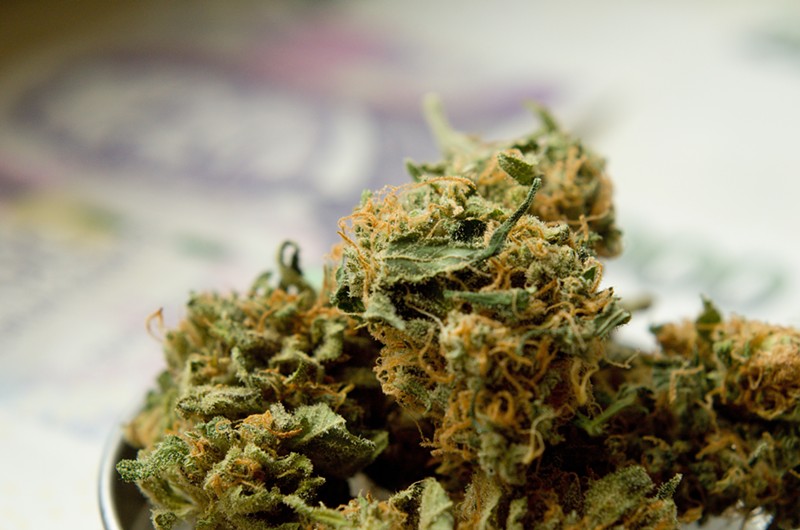Courts in Arizona's 15 counties have their marijuana offender system down to a science, with decades of practice in processing average folks for felony possession of small amounts of marijuana.
Now that voters have passed Prop 207, though, that entire system must change.
The legality of adults 21 and older possessing personal amounts of weed isn't the only existing law that Prop 207 affects. Among other things, it also defines rules for minors in possession, redefines how marijuana DUIs can be prosecuted, and revises policy so that the smell of marijuana smoke alone is no longer something that can give a police officer a "reasonable articulable suspicion" that a crime is occurring.
You've heard about people escaping a criminal charge because of a technicality? This requires the judicial system to be, well, technical. There are forms, procedures, protocols, and rules. Going from the most-widely charged felony in the state to legality and decriminalization won't be as easy as lighting a joint.
It will start with the presiding judges of the state's 15 county Superior Courts, who don't need a specific order to begin implementing Prop 207 changes, says Aaron Nash, an attorney who serves as communications director for the Arizona Supreme Court.
No single person will oversee the changes, but the Supreme Court's Administrative Office of the Courts (AOC) "will lead the implementation and develop guidance, training, and push out information that the individual courts will implement," Nash says.
That's the way the court has handled recent changes in eviction rules and courthouse-safety procedures because of the pandemic — lots of meetings and training sessions.
"Prop 207 changes will roll out along the same lines," Nash says.
Officials with the court's AOC reviewed Prop 207 before the election to see what rules, statutes, and case management systems would be adjusted to work with the changes, he says.
"Subject matter experts in different areas from the judicial branch will be involved in reviewing what might need to change in the laws, rules, forms, IT programming, and so on, and that will continue as the different provisions get closer to implementation," Nash says, adding that if court rule changes are needed, they could be expedited to work around the typical one-year cycle for rule petition filing, the comment period, and final adoption.
Changes will come later for the expungement part of the law, which enables people busted for low-level possession cases in the past to erase their convictions from public view. That won't take effect until July 12, 2021.
The rest of the law takes effect when the results of the election are certified by the state, something that will happen on November 30. (Unless, that is, Trump's lawyers miraculously come up with proof for their wild claims of election fraud and force a delay.) That means when police bring a 20-year-old before the court on suspicion of marijuana possession or claim that a 30-year-old should be charged with a felony for possessing two ounces instead of the legal one ounce, the justice system will need to respond with legal accuracy.
Gary Smith, founder and president of the Cannabis Bar Association of Arizona, says he believes the court system will be ready for the changes on Day One.
Even if some judges aren't "completely up to speed, I wouldn't worry too badly," Smith says. "Every one of those people [charged with a marijuana offense], they are going to have someone in their corner offering defense, and they are all going to know what the law is."
Some mistakes are bound to occur because it's a new law, Smith says. Police agencies, in particular, will likely be slower to accept the change than the judicial system.
History shows he's probably right about that. In June 2011, months after voters approved the state's medical marijuana law, Gilbert police raided the home of Ross Taylor, a medical marijuana advocate, after receiving a tip from a satellite-TV installer that Taylor had an ounce of weed. The agency neglected to tell a justice of the peace, who signed the search warrant, that Taylor had also told the tipster he had a medical marijuana card and the pot was legal to possess under state law. Cops put Taylor, his wife, and three movers who happened to be in the home in handcuffs, detaining them for an hour. Taylor was never charged.
For Prop 207, "the State Bar is aware, defense lawyers are aware, and the [judicial] benches should be aware," Smith says.
Numerous panels on Prop 207 and marijuana are scheduled by presenters at a virtual State Bar convention next week, he says, and the Smith's cannabis-focused group is bringing in state Appeals Court Judge David Gass to sit on their panel.
"That tells me the courts are plugged in," Smith says.
Ironically, the two Arizona counties that have been led by ardent foes of legalization in recent years, Maricopa and Yavapai, were the first two to announce the immediate dismissal of all pending marijuana possession that meet the new statutory thresholds for legality under Prop 207.

Audio By Carbonatix
[
{
"name": "Air - MediumRectangle - Inline Content - Mobile Display Size",
"component": "18478561",
"insertPoint": "2",
"requiredCountToDisplay": "2",
"watchElement": ".fdn-content-body",
"astAdList": [
{
"adType": "rectangle",
"displayTargets": "mobile"
}
]
},{
"name": "Editor Picks",
"component": "16759093",
"insertPoint": "4",
"requiredCountToDisplay": "1",
"watchElement": ".fdn-content-body",
"astAdList": [
{
"adType": "rectangleLeft",
"displayTargets": "desktop|tablet"
},{
"adType": "rectangleRight",
"displayTargets": "desktop|tablet|mobile"
}
]
},{
"name": "Inline Links",
"component": "17980324",
"insertPoint": "8th",
"startingPoint": 8,
"requiredCountToDisplay": "7",
"maxInsertions": 25
},{
"name": "Air - MediumRectangle - Combo - Inline Content",
"component": "16759092",
"insertPoint": "8th",
"startingPoint": 8,
"requiredCountToDisplay": "7",
"maxInsertions": 25,
"watchElement": ".fdn-content-body",
"astAdList": [
{
"adType": "rectangleLeft",
"displayTargets": "desktop|tablet"
},{
"adType": "rectangleRight",
"displayTargets": "desktop|tablet|mobile"
}
]
},{
"name": "Inline Links",
"component": "17980324",
"insertPoint": "8th",
"startingPoint": 12,
"requiredCountToDisplay": "11",
"maxInsertions": 24
},{
"name": "Air - Leaderboard Tower - Combo - Inline Content",
"component": "16759094",
"insertPoint": "8th",
"startingPoint": 12,
"requiredCountToDisplay": "11",
"maxInsertions": 24,
"watchElement": ".fdn-content-body",
"astAdList": [
{
"adType": "leaderboardInlineContent",
"displayTargets": "desktop|tablet"
},{
"adType": "tower",
"displayTargets": "mobile"
}
]
}
]












